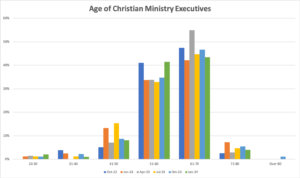Survey: Age of Ministry Executives Beginning to Trend Downward
A long-time executive recruiter is seeing retirements of the old guard of leaders.

Editor’s Note: This is the first article analyzing results of our January 2024 quarterly MinistryWatch survey sent to leaders of the country’s 1,000 largest Christian ministries. Of those, 100 responded. Articles related to past surveys can be found here.

Photo by Brett Jordan / Unsplash
Many executives leading Christian ministries across the country are over the age of 60, but the movement toward younger leaders may be growing.
According to MinistryWatch’s quarterly survey of the largest Christian ministries in the country, 47% of leaders who responded were over age 61. However, 53% were under the age of 60.
Results from the quarterly survey in April 2023 showed that 58% of Christian ministry leaders were over the age of 60.

In examining the trend among survey respondents, it appears the age of Christian ministry leaders may be shifting toward younger age groups.
Bruce Dingman, who has been involved in recruiting leaders for Christian ministries since 1995, says he believes that as leaders retire, the average age of leaders will decrease. He’s beginning to see the trend.
Dingman, who has helped recruit executive leadership for the Evangelical Council for Financial Accountability, Museum of the Bible, Christian Leadership Alliance, and over 70 other groups and churches, says he sees leaders typically retiring in their late 60s or early 70s.
He said leaders are often reluctant to retire, and ministries they lead have often not engaged in succession planning. Because of the ministry’s financial pressures and with no clear successor to take the reins, leaders have often stayed in their role into older ages.
But at some point they have to retire, Dingman pointed out. “My sense is that leaders are retiring a little bit older than a decade back. While the average age [of leaders] is going down some, that’s because the rate of turnover is higher due to retirements,” he told MinistryWatch.
Dr. Rich Kidd of the faith-based executive recruiting firm Mission:Leadership affirmed these observations, adding that when it comes time to replace the retiring leader, he has noticed governing boards are often skipping the 40 or 50-something generation and hiring a leader from the millennial generation.
Access to MinistryWatch content is free. However, we hope you will support our work with your prayers and financial gifts. To make a donation, click here.
He said older leaders who are also the founder of the organization are some of the most reluctant to retire. The board of directors might consider how to create an “emeritus” leader position that allows founders to remain connected, but also allows a new leader to take the helm.
“I wish people in leadership positions would not stay too long, but instead be open to how God is moving in them or in the ministry,” Dingman said.
Through his recruitment efforts, Dingman has learned that ministries definitely have a preference for hiring from within. A successful succession plan brings someone into the organization in middle or upper management about two or three years before the planned transition so they can get connected to the organization’s mission and have a meaningful role to play, Dingman said.

About 12.5% of survey respondents last month said that succession planning is the most significant challenge they face as a ministry leader. That number has been inching upward over the course of our surveys. In October 2022, only 5% said it was their most significant challenge, but in the last two surveys, that has risen to over 10% of respondents.



